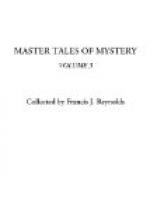At last we came to Albano’s little wine-shop, a dark, evil, malodorous place on the street level of a five-story, alleged “new-law” tenement. Without hesitation Kennedy entered, and we followed, acting the part of a slumming party. There were a few customers at this early hour, men out of employment and an inoffensive-looking lot, though of course they eyed us sharply. Albano himself proved to be a greasy, low-browed fellow who had a sort of cunning look. I could well imagine such a fellow spreading terror in the hearts of simple folk by merely pressing both temples with his thumbs and drawing his long bony fore-finger under his throat—the so-called Black Hand sign that has shut up many a witness in the middle of his testimony even in open court.
We pushed through to the low-ceilinged back room, which was empty, and sat down at a table. Over a bottle of Albano’s famous California “red ink” we sat silently. Kennedy was making a mental note of the place. In the middle of the ceiling was a single gas-burner with a big reflector over it. In the back wall of the room was a horizontal oblong window, barred, and with a sash that opened like a transom. The tables were dirty and the chairs rickety. The walls were bare and unfinished, with beams innocent of decoration. Altogether it was as unprepossessing a place as I had ever seen.
Apparently satisfied with his scrutiny, Kennedy got up to go, complimenting the proprietor on his wine. I could see that Kennedy had made up his mind as to his course of action.
“How sordid crime really is,” he remarked as we walked on down the street. “Look at that place of Albano’s. I defy even the police news reporter on the Star to find any glamour in that.”
Our next stop was at the corner at the little store kept by the cousin of Luigi, who conducted us back of the partition where prescriptions were compounded, and found us chairs.
A hurried explanation from Luigi brought a cloud to the open face of the druggist, as if he hesitated to lay himself and his little fortune open to the blackmailers. Kennedy saw it and interrupted.
“All that I wish to do,” he said, “is to put in a little instrument here and use it to-night for a few minutes. Indeed, there will be no risk to you, Vincenzo. Secrecy is what I desire, and no one will ever know about it.”
Vincenzo was at length convinced, and Craig opened his suit-case. There was little in it except several coils of insulated wire, some tools, a couple of packages wrapped up, and a couple of pairs of overalls. In a moment Kennedy had donned overalls and was smearing dirt and grease over his face and hands. Under his direction I did the same.
Taking the bag of tools, the wire, and one of the small packages, we went out on the street and then up through the dark and ill-ventilated hall of the tenement. Half-way up a woman stopped us suspiciously.
“Telephone company,” said Craig curtly. “Here’s permission from the owner of the house to string wires across the roof.”




